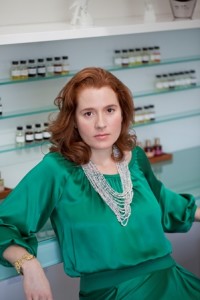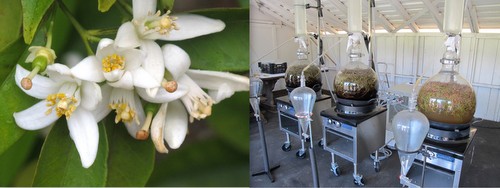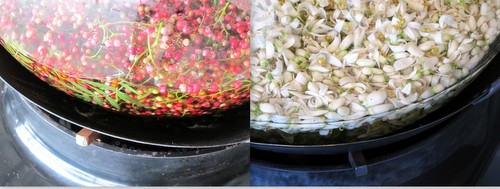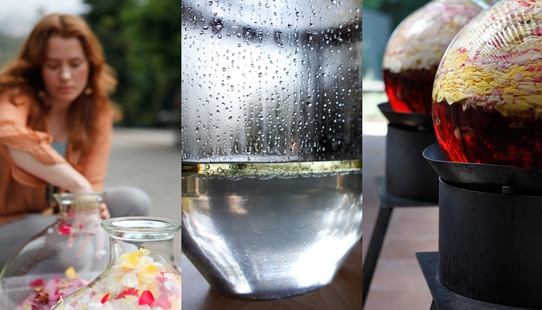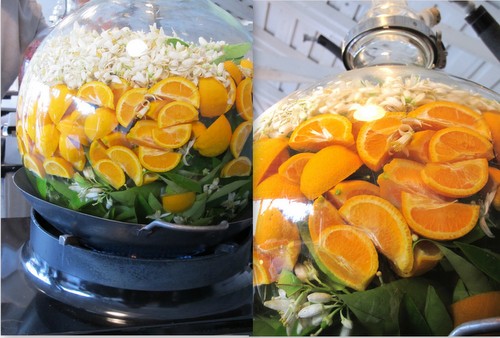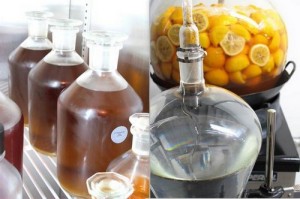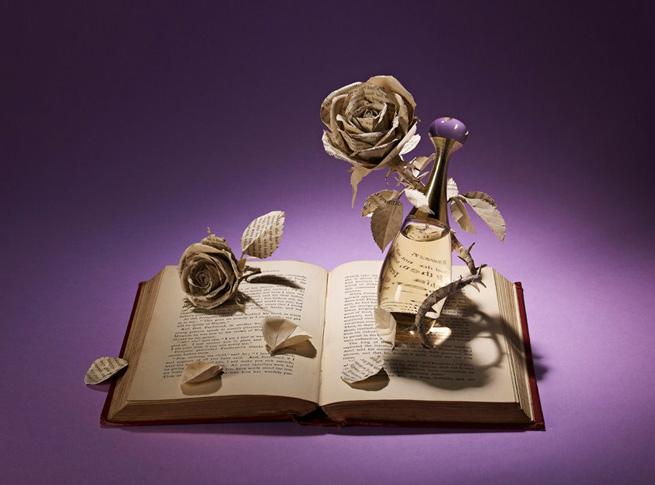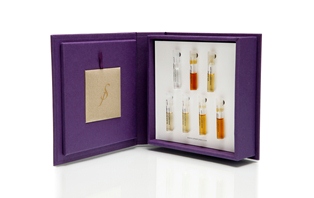Alexandra Balahoutis Olfactive Artist
Through the years, I have been asked to justify natural perfumery as an olfactory art—in the face of “expert” opinions that accept as legitimate only predominantly synthetic fragrances. Since I began designing perfumes, I have always maintained a fervent advocacy for botanicals. Yet I understand that there is more than one way to do things. I don’t condemn artificial ingredients in perfumery; I simply opt not to use them myself.
Before deciding to become a botanical perfumer, I decided to become a perfumer. I drank Coca-Cola and wore Chanel lipstick. I wasn’t motivated by a love of naturals or a commitment to them, but by my love of fragrance. I wanted to make elegant perfumes that echoed my love for storytelling, art, and fashion. I considered synthetics; I just didn’t like them. They seemed prefabricated and flat. I loved the idea of weaving organic raw materials into beautiful compositions, collaborating only with master distillers who capture the mystery of reverently handled plants and flowers.
Hydro distillation orange blossom (subject to Copyright)
Some say that I “limit” myself to a natural palette, but I don’t feel limited at all. I source hundreds of exceptional ingredients from all over the world. Each originates from a different corner of the globe and carries a different story. I work with gorgeous, many-layered essences skillfully hydro-distilled from living plants. Is it truly possible to perfectly simulate the staggeringly complex scent of a live flower with a synthetic chemical? Braja Mookherjee, the eminent chemist who invented headspace technology to formulate synthetics for IFF didn’t think so, though it was his life’s work to try “to come as close as possible to nature.” But even he—the scientist responsible for the most patents on synthetic aromas—acknowledged that “nature is the greatest inventor in the universe” and that the scent of living plants was ultimately too elusive to fully re-create. Clearly, synthetic aromas come with limits of their own. I choose instead to draw from an extensive palette of deeply nuanced natural essences, and I feel no lack of possibility.
Just the same, I respect perfumers who work with palettes very different from my own. Some are even close friends. They incorporate synthetic and natural essences in their formulas while prioritizing beauty and quality. I certainly understand this approach, especially given the pressures of the market. I do, however, disagree with those who would replace nearly every natural essence with an artificial version that cannot hold a candle to the real thing.
The word innovation gets thrown around quite a bit in association with artificial aromas—as if using these petroleum-derived materials results in a more sophisticated fragrance. But let’s be straight about this: it has everything to do with the bottom line. Synthetic essences are ubiquitous in commercial fragrances because they are much lower in cost and easier to mass-produce, source, and store.
pink peppercorn and orange blossom raw materials
And paradoxically, while innovation is cited as a virtue of the synthetic enterprise, in their marketing, synthetic fragrances always pay homage to the mystique of the natural essences they mean to mimic. After all, the original perfumery romantically extolled in best-selling novels of earlier centuries was botanical perfumery. I find it puzzling that anyone, especially any connoisseur of perfume, could be fundamentally opposed to the use of actual plants and flowers—the source of all perfumes’ allure, whether their components are distilled from the real thing or re-created in the chemist’s lab.
Alexandra Balahoutis – Hydro Distilled Rose (subject to Copyright)
While some say that natural perfumery is trapped in the past, true innovation is possible—and vital to my work. In fact, when I founded my company in 2000, my approach was considered pretty cutting-edge. At that time, the market was devoid of botanical fragrances and filled with cloying synthetic perfumes that all smelled alike. My work was, in a sense, very new. I set out to formulate modern botanical perfumes. I loved the nuanced, textural aromas of vetiver, labdanum, hydro-distilled rose, blue lotus, and Himalayan cedar. I did not want factory-born flowers. I wanted the real thing, so I had to make it. To revive older methods in order to create new works with a contemporary aesthetic is innovative.
And last, some perfume experts exclude botanical perfumery as a legitimate expression of the perfumer’s art. That such authorities would presume to oust an artist, work, or method of art from being considered as part of that art—based on any criterion—strikes me as reactionary and even prissy, but more important, as antithetical to one crucial defining quality of art: creation that transcends rules.
I have not encountered this style of thinking in any other arena. Synthetic flavorings are scarcely found in five-star restaurants. They never even enter the conversation where fine wine is concerned. People would hardly pay thousands of dollars for an Hermès Birkin bag made of vinyl. Artists who use archaic pigments or egg tempera are still considered artists. Farm-to-table chefs who reject genetically modified produce or insist upon grass-fed beef are still thought of as chefs. Just imagine Karl Lagerfeld announcing smugly to the world that any designer who uses silk rather than acetate is old-fashioned and not even a real designer. Was Stanley Kubrick’s Barry Lyndon a film we should dismiss because Kubrick chose to light it with only natural light and candlelight? Unfortunately, perhaps because of its elusiveness, fragrance is the perfect prey for this Emperor’s-New-Clothes set of experts, who license themselves to declare how beautiful or valid a creation is (or is not). I trust that those who are not such experts will respond to my perfumes without this kind of prejudice.
Hydro Distillation orange in natural perfumery (subject to Copyright)
This raises another question. If there were people protesting the legitimacy of organic, locally grown produce, who would those people be? Would they be world-class chefs? If there were others opposed to the current use by artists of historical paint formulas, asserting instead that a painting cannot qualify as art unless composed of acrylic pigments, who would those people be? Would they be museum curators or art historians? Would they be artists? I don’t imagine so. Would they perhaps be lobbyists or companies that manufacture cheap acrylic paint?
Hydro distillation lemons (subject to Copyright)
Can natural perfumery be taken seriously as an olfactory art? I’ve been hearing this question forever and answering it forever, and frankly, the question itself is an absurdity. Here’s a different question: Why are these experts so interested in discrediting botanical perfumery? Maybe the real sleight-of-hand has been convincing people that there is a question at all. Wouldn’t that be a clever trick—to persuade people that expensive perfume, very inexpensive to produce, is the best perfume, and that artificial ingredients are the true hallmark of quality.
–Alexandra Balahoutis, Founder and Natural Perfumer, Strange Invisible Perfumes and Guest Contributor
source: stylist magazine
Editor's Note: I have been writing professionally about fragrance since 2003. It never made a difference to me if a fragrance was 100 percent natural or was composed predominately of synthetics. I wrote about perfumes that moved me, that told a story. Two natural perfumes that awed me with their complexity and artistry were Strange Invisible Perfumes Musc Botanique (2008- a clean, bright crystalline musk scent that feels lit from within) and Black Rosette (2005- dark earthy almost gothic fragrance that smells of leather and smoky roses). Today, they are unique works of art and hold their own amongst the most memorable niche, designer, artisan, mainstream and natural fragrances that I have tested (over 3000 and counting). Recently, I encountered a conversation where a group of people were bashing all natural perfumes as "smelling lousy" and attempting to condemn an entire genre, just as many fragrance "Critics" have over the past decade. These individuals claim that ALL natural perfumery is more like aromatherapy than "real pefume". At CaFleureBon we choose to feature and bring to a wider audience fragrances that we believe are extraordinary. And as Alexandra so eloquently states, "Just the same, I respect perfumers who work with palettes very different from my own who prioritize beauty and quality”. We believe that great olfactive artists are not defined by their palette, but by their ability to create liquid emotion. A great olfactive artist makes tangible that which is invisible. -Michelyn Camen, Editor, In Chief
Alexandra is offering a worldwide draw (which is a first for the Company) for the Strange Invisible Perfumes Mini Bar. All of our readers, who want to have the opportunity to experience natural perfumery as Olfactive Art, please leave a comment about Ms. Balahoutis' defense and/or what your own feelings are towards the definition of olfactory Art. Draw ends July 15, 2013
We announce the winners only on site and on our Facebook page, so Like Cafleurebon and use our RSS option…or your dream prize will be just spilled perfume.

